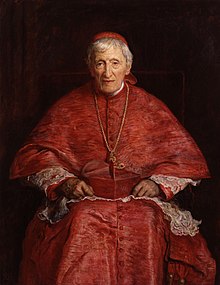Argument from morality
German philosopher Immanuel Kant devised an argument from morality based on practical reason.
In his book Mere Christianity, C. S. Lewis argued that "conscience reveals to us a moral law whose source cannot be found in the natural world, thus pointing to a supernatural Lawgiver.
Contemporary defenders of the argument from morality are Graham Ward, Alister McGrath and William Lane Craig.
Some of these arguments propose moral facts which they claim evident through human experience, arguing that God is the best explanation for these.
[6] Philosopher G. H. R. Parkinson notes a common objection to Kant's argument: that what ought to be done does not necessarily entail that it is possible.
He also argues that alternative conceptions of morality exist which do not rely on the assumptions that Kant makes – he cites utilitarianism as an example which does not require the summum bonum.
Atheist philosopher J. L. Mackie accepted that, if objective moral truths existed, they would warrant a supernatural explanation.
Morality might be better understood as an evolutionary imperative in order to propagate genes and ultimately reproduce.
Scottish empiricist David Hume made a similar argument, that belief in objective moral truths is unwarranted and to discuss them is meaningless.
He argued that emotivism is an inadequate explanation of the human experience of morality because people avoid acting immorally, even when it might be in their interests.
Even if a supernatural cause is required, he argues, it could be something other than God; this would mean that the phenomenon of the conscience is no more supportive of monotheism than polytheism.
[17] C. S. Lewis argues for the existence of God in a similar way in his book Mere Christianity, but he does not directly refer to it as the argument from morality.

